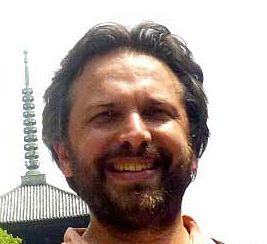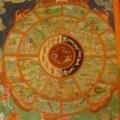7. Brian Black on the Upanisads
An interview with Brian Black about the philosophical and social aspects of the Upaniṣads.
Themes:
B. Black and L. Patton (eds), Dialogue in early South Asian Religions: Hindu, Buddhist, and Jain traditions (Farnham: 2015).
B. Black, “Senses of Self and Not-self in the Upaniṣads and Nikāyas,” in Hindu and Buddhist Ideas in Dialogue: Self and No-self (Farnham: 2012), 11-27.
B. Black, “The Rhetoric of Secrecy in the Upanishads,” in Religion and Identity in South Asia and Beyond: Essays in Honor of Patrick Olivelle (London: 2011), 101-25.
B. Black, “Ambaṭṭha and Śvetaketu: Literary connections between the Upaniṣads and early Buddhist Narratives,” Journal of the American Academy of Religion 79 (2011), 136-61.
B. Black, “Rethinking the Upaniṣads Vaṃśas: Teacher Lineages as a Literary Genre,” Religions of South Asia 5 (2011), 51-77.
B. Black, “Rivals and Benefactors: Encounters between Buddhists and Brahmins in the Nikāyas,” Religions of South Asia 3 (2009), 25-43.
S. Brodbeck and B. Black (eds), Gender and Narrative in the Mahābhārata (London: 2007).
B. Black, The Character of the Self in Ancient India: Priests, Kings, and Women in the Early Upaniṣads (Albany, N.Y.: 2007).

Origins


 ..
..



Comments
Upanishads Question
Hi, LOVE these podcasts.
This question is so stupid it's embarrassing but since this is private email, here goes.
Characters in he Upanishads: I got that some characters are avatars of known Gods, and some are Brahmins and priests. What got confusing is in Episode 7 the guest speaker started talking about which philosopher was commenting which is a technique to give the idea presented weight. Are any of the characters in the Upanishads identifiable and identified historical figures who actually lived? If yes, how do you know that? Also, if yes, how does one treat characters who haven't been identified as actual people...are scholars assuming they are fictional characters or are they holding that issue open until all the ancient texts are located and translated?
Thanks fo any clarification.
Cindy Capwell
In reply to Upanishads Question by Cindy Capwell
Historical characters in Upanisads
Hi - That's actually a great question, and in fact I think probably the answer is that most of the speakers in the Upanisads do not appear in external historical evidence. But we have the same sages appearing in several Upanisads and other texts (for instance Yajnavalkya). This in itself seems good evidence that there was such a person though not, of course, that they said everything ascribed to them in the Upanisads. However I'm not really an expert on this so others may want to add more.
Perennial Philosophy
Thinking about Aldous Huxley and his fascination with the Upanisads, I wonder if it would be appropriate at some point to open up another chapter of talks focused on the concept of the "Perennial Philosophy" that became so popular in the late 20th century. I am aware that many consider it too broad a category, that it did not take into account the distinctive cultural environment in which thinker lived. And I am aware that the fascination with broad generalizations have been blamed for much of the cult thinking that quickly led to many sordid abuses. But there also seems to be some real power and appeal in the idea that all the philosophies that are being covered here "without any gaps" may have a common ground simplified in a way that would do no disrepect to any philosophical tradition. A risky endeavor, but I am sure it has or will occure to you.
In reply to Perennial Philosophy by Tony Heiderer
Perennial philosophy
Yes, in some ways it is actually the antithesis of what we have done here on the podcast which is to look at all the different traditions separately with very few cross-comparisons, except where there is actual historical influence.
Actually we did touch on this already at the end of the Islamic world series, when we discussed Seyyed Hussein Nasr in episode 194: he is a big proponent of the perennial philosophy idea. And it came up again to some extent when talking about Ficino and Pico in the Italian Renaissance.
Add new comment